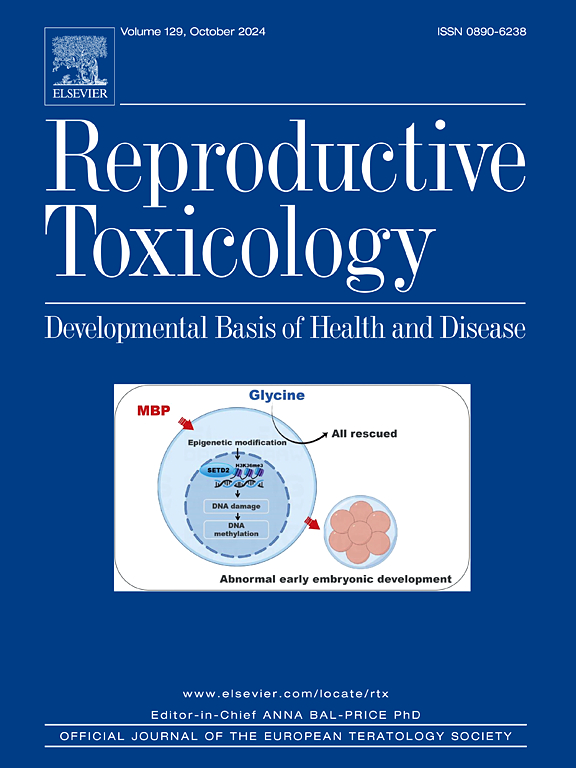小鼠体外受精过程中囊胚暴露于塑料会影响胎盘发育
IF 3.3
4区 医学
Q2 REPRODUCTIVE BIOLOGY
引用次数: 0
摘要
通过辅助生殖技术(ARTs)怀孕与孕产妇、新生儿和长期不良健康问题的显著流行有关。这些异常通常归因于这些程序中涉及的体外操作。人们对培养基的质量提出了关切,然而,对体外受精(IVF)中使用的装置的化学成分的潜在影响的分析却很少。通过比较体外受精获得的小鼠囊胚在塑料器皿、玻璃器皿和自然孕育的胎盘的转录组,我们已经确定塑料器皿对胎盘发育有深远的影响。方法转录组学、转录组反褶积分析、基因集富集分析。结果塑料制品主要在滋养细胞间室改变胎盘基因表达,改变细胞组成,有利于糖原细胞。这些修饰与表观遗传机制的改变相关(印迹基因的改变、microrna表达的改变、甲基化改变)。此外,性别分层分析显示,这些影响在女性胎盘中比在男性胎盘中更为剧烈。玻璃器皿对胎盘转录组和细胞组成的影响较温和,特别是对印迹基因或microrna表达的影响较低。结论试管婴儿过程中塑料器皿中的体外培养可能通过塑料器皿释放的影响表观遗传因子(印迹基因、mirna和DNA甲基化)的因素,对胎盘中的基因表达和/或细胞组成进行性别特异性改变。本文章由计算机程序翻译,如有差异,请以英文原文为准。
Blastocyst exposure to plastic during mice in vitro fertilization impacts placental development
Introduction
Pregnancies from Assisted Reproductive Technologies (ARTs) are associated with a significant prevalence of maternal, neonatal and long-term adverse health issues. These anomalies are generally attributed to the in vitro manipulations involved in these procedures. Concerns have been raised on the quality of the culture media, however the potential influence of the chemical composition of the devices used in the in vitro fertilization (IVF) has been poorly analysed. By comparing the transcriptomes of placentas from mouse blastocysts obtained by IVF on plasticware, glassware and naturally conceived, we have previously established that plasticware profoundly impacts placental development.
Methods
Transcriptomics, transcriptome deconvolution analysis, Gene Set Enrichment Analysis.
Results
Plasticware alters placental gene expression mostly in the trophoblast compartment, and alters cell composition favouring Glycogen Cells. These modifications correlate with alterations of epigenetic mechanisms (alterations of imprinted genes, microRNAs expression, methylation alterations). Also, sex-stratified analysis reveals that these effects are more drastic in female than male placentas. The effect of glassware on the transcriptome and cellular composition of the placenta is milder, and in particular has lower impact on the imprinted gene or microRNAs expression.
Conclusion
In vitro culture in plasticware during IVF procedures sex-specifically alters gene expression and/or cell composition in the placenta, possibly through factors released by the plasticware having an action on epigenetic actors (imprinted genes, miRNAs and DNA methylation).
求助全文
通过发布文献求助,成功后即可免费获取论文全文。
去求助
来源期刊

Reproductive toxicology
生物-毒理学
CiteScore
6.50
自引率
3.00%
发文量
131
审稿时长
45 days
期刊介绍:
Drawing from a large number of disciplines, Reproductive Toxicology publishes timely, original research on the influence of chemical and physical agents on reproduction. Written by and for obstetricians, pediatricians, embryologists, teratologists, geneticists, toxicologists, andrologists, and others interested in detecting potential reproductive hazards, the journal is a forum for communication among researchers and practitioners. Articles focus on the application of in vitro, animal and clinical research to the practice of clinical medicine.
All aspects of reproduction are within the scope of Reproductive Toxicology, including the formation and maturation of male and female gametes, sexual function, the events surrounding the fusion of gametes and the development of the fertilized ovum, nourishment and transport of the conceptus within the genital tract, implantation, embryogenesis, intrauterine growth, placentation and placental function, parturition, lactation and neonatal survival. Adverse reproductive effects in males will be considered as significant as adverse effects occurring in females. To provide a balanced presentation of approaches, equal emphasis will be given to clinical and animal or in vitro work. Typical end points that will be studied by contributors include infertility, sexual dysfunction, spontaneous abortion, malformations, abnormal histogenesis, stillbirth, intrauterine growth retardation, prematurity, behavioral abnormalities, and perinatal mortality.
 求助内容:
求助内容: 应助结果提醒方式:
应助结果提醒方式:


